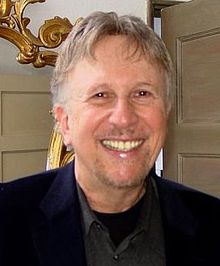This article has multiple issues. Please help improve it or discuss these issues on the talk page. (Learn how and when to remove these messages)
|
Jack Sarfatti (born September 14, 1939) is an American theoretical physicist. Working largely outside academia, most of Sarfatti's publications revolve around quantum physics and consciousness.
Jack Sarfatti | |
|---|---|
 Sarfatti in 2007 | |
| Born | September 14, 1939[1] New York City, U.S. |
| Education | |
| Website | stardrive.org |
Sarfatti was a leading member of the Fundamental Fysiks Group, an informal group of physicists in California in the 1970s who, according to historian of science David Kaiser, aimed to inspire some of the investigations into quantum physics that underlie parts of quantum information science.[2][3] Sarfatti co-wrote Space-Time and Beyond (1975; credited to Bob Toben and Fred Alan Wolf) and has self-published several books.[4]
Early life and education
editSarfatti was born in Brooklyn, New York, to Hyman and Millie Sarfatti and raised in the borough's Midwood neighborhood.[5] His father was born in Kastoria, Greece, and moved to New York as a child with his family.[6]
After graduating from Midwood High School in 1956, Sarfatti attended Cornell University, where he received a B.A. in physics in 1960. Following graduate studies at Cornell and Brandeis University,[7] he obtained an M.S. in 1967 from the University of California, San Diego and a Ph.D. in 1969 from the University of California, Riverside under Fred Cummings, both in physics; his dissertation was "Gauge Invariance in the Theory of Superfluidity."[8]
Career
editFrom 1967 to 1971, Sarfatti was an assistant professor of physics at San Diego State University. He also studied at the Cornell Space Science Center, the UK Atomic Energy Research Establishment, the Max Planck Institute for Physics, and International Centre for Theoretical Physics.[7][9] Then he decided to leave academia around the time when he was in Trieste.
Sarfatti was invited to help shape the 100 Year Starship program.[10]
Sarfatti's ideas relating quantum physics to David Chalmers's "hard problem" (i.e. how our conscious experiences are generated) are mentioned in a paper by Paavo Pylkkänen.[11]
Sarfatti claims to have been recruited by agents of the CIA and DOD to work on both the physics of consciousness and the propulsion of "flying saucers" back in the 1970s.[citation needed] MIT professor David Kaiser mentions these connections in his book How the Hippies Saved Physics. As evidence Sarfatti cites a recording of his 1973 meeting with Harold E. Puthoff, Russell Targ, and others on his visit to Stanford Research Institute.[12]
Sarfatti's name appears in several released CIA documents including a summary for the STARGATE project for remote viewing published June 1, 1979.[13]
Politics
editAccording to Kaiser, Sarfatti's politics have leaned to the right since the early 1980s, when he became dependent on a cadre of "politically conservative thinkers who were drawn to certain New Age ideas" for research funding, following the dissolution of his relationship with Werner Erhard.[14]
Other activities
editA longtime habitué of Caffe Trieste, Sarfatti has been involved in the Fundamental Fysiks Group, the Esalen Institute-affiliated Physics–Consciousness Research Group, and the 100 Year Starship project.[15][16]
Selected works
edit- Toben, Bob (1975). Space-Time and Beyond: Toward an Explanation of the Unexplainable. E.P. Dutton (Toben in conversation with Fred Alan Wolf and Jack Sarfatti). ISBN 978-0-525-47399-2
- Sarfatti, J.; Stoneham, A.M. (1966). "The Goldstone Theorem and the Jahn-Teller Effect" (PDF). Proceedings of the Physical Society. 91 (1): 214–221. doi:10.1088/0370-1328/91/1/331.
- Sarfatti, Jack (2020). "Henry Stapp's Influence on My Post-Quantum Mechanics of Consciousness Via Locally Decodable Keyless Entanglement Signaling". Activitas Nervosa Superior. 62: 25–28. doi:10.1007/s41470-019-00060-1. S2CID 191144774.
References
edit- ^ Stephen Schwartz, "The Universe, As Seen From North Beach", San Francisco Chronicle, August 17, 1997, p. 5.
- ^ Kaiser 2011, p. xxiiiff; David Kaiser, "Lecture: How the Hippies Saved Physics", WGBH PBS, April 28, 2010 (hereafter Kaiser 2010), from 04:00 mins, particularly from 11:00 mins.
Gusterson, Hugh (2011). "Physics: Quantum outsiders". Nature. 476 (7360): 278–279. Bibcode:2011Natur.476..278G. doi:10.1038/476278a. S2CID 4347880.
- ^ George Johnson, "What Physics Owes the Counterculture", The New York Times, June 17, 2011.
- ^ For Sarfatti's authorship of Space-Time and Beyond, Kaiser 2011, p. 136; Rosen 1994, p. 141; also see Kaiser 2010, from 23:22 mins.
- ^ Technology Review, Association of Alumni and Alumnae of the Massachusetts Institute of Technology, 1976, p. 1; Jack Sarfatti, Destiny Matrix. AuthorHouse, 2002, p. 93.
- ^ Sarfatti, Hyman (October 2014). "My Story: Cosmic Consciousness & Me". Scientific GOD Journal. 5 (8): 660–682 [660, 664].
- ^ a b Alex Burns, "Jack Sarfatti: Weird Science" Archived February 26, 2014, at the Wayback Machine, 21C magazine, 1996.
- ^ For the MS, Schwartz 1997, p. 5; for the PhD, Jack Sarfatt[i], "Gauge Invariance in the Theory of Superfluidity", The Smithsonian/NASA Astrophysics Data System.
- ^ "If the beer don't get you, then the black holes must," New Scientist, October 18, 1973, p. 165.
- ^ Weinberger, Sharon (March 21, 2012). "100 Year Starship: An interstellar leap for mankind?". BBC Future. Retrieved May 28, 2022.
- ^ Pylkkänen, Paavo (July 2, 2022). "Is the Brain Analogous to a Quantum Measuring Apparatus?". In Shyam Wuppuluri; Anthony C. Grayling (eds.). Metaphors and Analogies in Sciences and Humanities. Synthese Library. Vol. 453. Springer Science+Business Media. pp. 215–235. doi:10.1007/978-3-030-90688-7. ISBN 978-3-030-90688-7. S2CID 249219812. Retrieved January 1, 2023.
- ^ Sarfatti, Jack (March 10, 2020). "1973 "CIA" recording Sarfatti, Puthoff, Targ, O Regan SRI UFO from Future". SoundCloud. Retrieved January 1, 2023.
- ^ https://www.cia.gov/readingroom/search/site/sarfatti [bare URL]
- ^ Kaiser 2011, p. 63.
- ^ H. M. Collins and T. J. Pinch, Frames of Meaning: The Social Construction of Extraordinary Science, Routledge, 2013, p. 189, n. 4.
- ^ Kaiser 2011, pp. 15, 298, n. 18.
Sources
edit- Kaiser, David (2011). How the Hippies Saved Physics: Science, Counterculture, and the Quantum Revival. W. W. Norton. ISBN 9780393076363. OCLC 758540688.
Further reading
edit- Stardrive.org, Sarfatti's website
- Jack Sarfatti, academia.edu